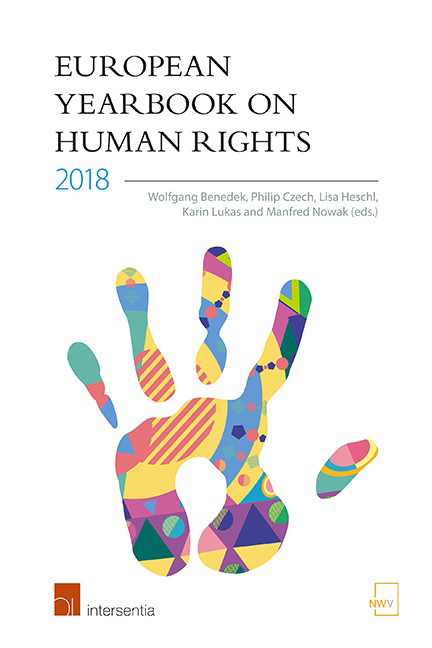Book contents
- Frontmatter
- Scientific Advisory Board
- Editors’ Preface
- Contents
- List of Abbreviations
- List of Contributors
- Part I Topic Of The Year
- Part II Eu
- Part III Coe
- PART IV OSCE
- Part V Others
- Part VI Book Reviews
- Katja S. Ziegler, Elizabeth Wicks and Loveday Hodson (eds.): The UK and European Human Rights – A Strained Relationship?
- Emily Reid: Balancing Human Rights, Environmental Protection and International Trade – Lessons from the EU Experience
- Nicole Bürli: Third-Party Interventions before the European Court of Human Rights
- Stijn Smet and Eva Brems (eds.): When Human Rights Clash at the European Court of Human Rights – Conflict or Harmony?
- Violeta Moreno-Lax: Accessing Asylum in Europe, Oxford Studies in European Law
- Mark Dawson: The Governance of EU Fundamental Rights
- Philip Leach: Taking a Case to the European Court of Human Rights, 4th Edition
- Sionaidh Douglas-Scott and Nicholas Hatzis (eds.): Research Handbook on EU Law and Human Rights
- Lauri Mälksoo and Wolfgang Benedek (eds.): Russia and the European Court of Human Rights – The Strasbourg Effect
- Index
Mark Dawson: The Governance of EU Fundamental Rights
from Part VI - Book Reviews
Published online by Cambridge University Press: 31 January 2019
- Frontmatter
- Scientific Advisory Board
- Editors’ Preface
- Contents
- List of Abbreviations
- List of Contributors
- Part I Topic Of The Year
- Part II Eu
- Part III Coe
- PART IV OSCE
- Part V Others
- Part VI Book Reviews
- Katja S. Ziegler, Elizabeth Wicks and Loveday Hodson (eds.): The UK and European Human Rights – A Strained Relationship?
- Emily Reid: Balancing Human Rights, Environmental Protection and International Trade – Lessons from the EU Experience
- Nicole Bürli: Third-Party Interventions before the European Court of Human Rights
- Stijn Smet and Eva Brems (eds.): When Human Rights Clash at the European Court of Human Rights – Conflict or Harmony?
- Violeta Moreno-Lax: Accessing Asylum in Europe, Oxford Studies in European Law
- Mark Dawson: The Governance of EU Fundamental Rights
- Philip Leach: Taking a Case to the European Court of Human Rights, 4th Edition
- Sionaidh Douglas-Scott and Nicholas Hatzis (eds.): Research Handbook on EU Law and Human Rights
- Lauri Mälksoo and Wolfgang Benedek (eds.): Russia and the European Court of Human Rights – The Strasbourg Effect
- Index
Summary
Mark Dawson's The Governance of EU Fundamental Rights provides a comprehensive overview of how the European Union (EU) is protecting and enforcing fundamental rights. Highlighting the central role that fundamental rights have acquired in the political debate on the EU‘s action and evolution, Dawson aims to critically explain the evolution of EU fundamental rights in the past 10 years.
For this purpose, the author starts by framing the theoretical debate surrounding EU fundamental rights, underlining the suis generis nature of this legal order. Dawson makes an interesting point on the important proactive role of the EU institutions on the protection and fulfilment of the fundamental rights across the EU.
This study is followed by the analysis of the performance of the EU‘s institutions in the fundamental rights field. After a comprehensive and very valuable study, the author points out that the institutional diversity within the EU could be a double-edged sword: there are too many deficiencies in relation to the fundamental rights performance of some institutions, but, at the same time, the interaction (and even competition) between these institutions can limit the impact of measures seeking to restrict fundamental rights.
Finally, the author presents some case studies related to two policy fields–social rights and the protection of the rule of law. Hungary and Romania are the two scenarios chosen by the author to depict the crisis of the rule of law in the EU. Those are two useful examples for the reader in order to understand the reality and challenges that EU‘s rule of law is facing. Greece, Portugal and Ireland are later studied to illustrate the deep hole that the ‘ Euro crisis ‘ exposed in the EU‘s constitutional framework. These three countries are a clear example of how their citizens ‘ fundamental rights were severely affected by the austerity measures that the EU, with its coercive power, imposed. The choice of a case of the recent past that had such strong repercussions for the citizens ‘ rights and that uncovered strong divides in the construction of the European project proves to be a very interesting and useful one.
- Type
- Chapter
- Information
- European Yearbook on Human Rights 2018 , pp. 613 - 614Publisher: IntersentiaPrint publication year: 2018



